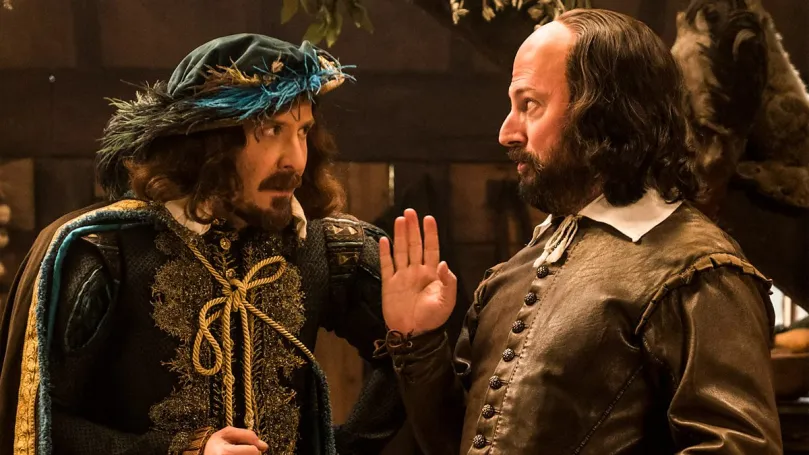
The Real Upstart Crow Feud: Fact vs Fiction
Upstartcrowthecomedy – When audiences today hear the phrase “upstart crow,” many immediately think of witty sitcom references and Shakespearean banter. However, long before pop-culture parodies, the words began as a sharp literary weapon aimed at a rising playwright. The world of Elizabethan theatre was competitive, emotional, and hungry for reputation. Therefore, when a newcomer from Stratford began capturing attention, it was only a matter of time before someone protested. That moment marked the birth of the upstart crow feud, a clash that blended ego, class anxieties, and creative rivalry.
Shakespeare did not begin his career in noble halls or scholarly circles. Instead, he rose from modest beginnings, stepping into a theatre system controlled largely by learned dramatists. As a result, his early success challenged long-standing hierarchies. Moreover, his natural ability to craft compelling characters and memorable verse infuriated older writers who expected literary dominance to come only through formal education. One of them, Robert Greene, eventually released a printed attack calling Shakespeare an “upstart crow,” claiming he stole others’ feathers. That public remark launched the upstart crow feud, linking their names forever in literary history.
Read More :Story Beats Every Journalist Should Master
To fully understand the upstart crow feud, we must first understand the world it unfolded in. London’s theatres were loud, ambitious, and ruthless. Playwrights worked fast, companies competed fiercely, and audiences demanded novelty. Consequently, status was fragile, and any rising star threatened the established order. For university-educated writers, watching an actor-turned-playwright soar meant losing intellectual territory and financial opportunity.
Furthermore, theatre was democratizing the arts. Nobles and common workers shared benches and standing spaces. Writers, once sheltered in academic halls, suddenly faced open-market criticism. Shakespeare embraced this energy. Greene feared it. Therefore, conflict was not only personal; it reflected a shifting artistic culture.
Greene was brilliant but troubled. He enjoyed early acclaim, wrote prolifically, and lived theatrically. Yet, he battled debt, illness, and insecurity. As Shakespeare’s popularity grew, Greene’s confidence shrank. Consequently, his pamphlet attacking Shakespeare reads not as a confident insult, but as a desperate outcry from someone watching the spotlight move. The origin of the upstart crow feud was rooted in vulnerability rather than malice.
Shakespeare brought emotion, rhythm, and relatability to the stage. Although he lacked formal academic credentials, he possessed insight into human nature, humor, tragedy, and class tension. As his plays succeeded, he proved that genius is not born inside universities alone. The upstart crow feud symbolized society’s discomfort with mobility; Shakespeare climbed without permission, and that unsettled many.
Greene accused Shakespeare of being an imitator, using imagery of a crow dressed in others’ feathers. The phrase “Shake-scene” mocked Shakespeare’s theatrical ambitions. Importantly, this passage is the only recorded direct attack on Shakespeare by a contemporary playwright. Thus, the upstart crow feud is small in text but enormous in symbolism: it captured a moment when the creative world shifted.
Interestingly, after Greene died, writer Henry Chettle apologized for Greene’s comments, claiming many admired Shakespeare personally and artistically. This apology weakened Greene’s attack and strengthened Shakespeare’s reputation. As a result, the upstart crow feud ended not in disgrace for Shakespeare, but in quiet validation. Talent earned loyalty.
Competition can sharpen brilliance. Shakespeare continued evolving after the insult, delivering plays richer in insight and complexity. Therefore, many historians argue that the upstart crow feud indirectly empowered him. Rivalry can be destructive, but it can also ignite excellence. Here, it did the latter.
Today, sitcoms and comedic sketches dramatize this feud for humor. They blend fact with fictional silliness, giving audiences a friendly parody of Elizabethan egos. However, beyond the jokes lies truth: the upstart crow feud mirrored class struggle, career anxiety, and creative disruption. Modern creatives still experience similar battles.
From this rivalry, we learn timeless lessons:
Art threatens hierarchy
Outsiders reshape culture
Talent outlasts gatekeeping
Confidence can mask insecurity
Rivalries fuel evolution
Therefore, the upstart crow feud remains relevant not only as a literary curiosity but as a metaphor for every field where new voices rise.
Even centuries later, audiences are drawn to the human drama in this conflict. Ambition, jealousy, and unexpected success are universal themes. Shakespeare’s story shows that talent can bloom anywhere, and Greene’s struggle shows how fragile pride can feel in changing times. The upstart crow feud endures because it reflects our own insecurities and aspirations, whether on a Renaissance stage or in a modern creative industry.
This website uses cookies.